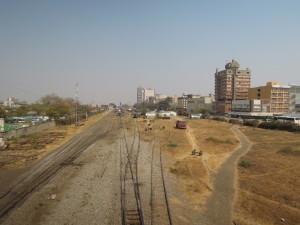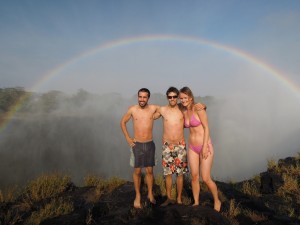Usually, at the end of every country, we try to sum up our impressions in a general review. In Zambia we only stayed for 8 days so it would be too bold to do the same here. Instead, we decide to share some thoughts. Given the short time, these should be taken with a grain of salt.
Zambians advertise their country as “The Real Africa”. Probably this goes together with the experiences many expats and volunteers make here. But for tourists, there is hardly any other land where it is so difficult to discover the real life. Zambia is extremely divided into rich and poor. A minority has already made their way into the 21st century and their lives do not differ much from the ones anywhere in the western world. Yet the majority continues to live like in the past centuries, either on the countryside or they came to the city and form some kind of modern proletariat. While travelling you will almost always deal with the First World in Zambia. There is nearly no way to travel like we did in Tanzania. Guest-houses for locals are hard to find and often located in areas that are not safe for whites (at least they say so). Public transport is limited to Livingstone and the Copperbelt, most other points of interest are not covered. So most of the time you end up in a bubble. The guests of your hostel are all white, the service has western standards and western prices, you do not have contact to locals (except the cashier in the supermarket) and it all feels a bit unreal and artificial.



Believe it or not, Zambia will be the most expensive country of the whole trip, even without the pricey activities at the Victoria Falls. At least, travelling here was very comfortable. Admittedly we just stayed at the main tourist spots, but this was also because it is almost impossible to reach the other regions. Of course, you can hire a 4-wheels drive and go camping, but most people who can afford that do pitch their tent in upper-class lodges. Again, we would not consider this to be “The Real Africa”.
Still, we are happy we came here and saw another different face of Africa. We never had thought that each country on the Black Continent would be so distinct. This distinctness is even more astonishing when considering the way people regard themselves. Africans first identify with the whole continent before putting their specific nation in front. They are proud of their welcome and their friendliness towards foreigners. You will always hear them saying that “Africans” are great, no matter whether they are Congolese, Tanzanian or Zambian.
Contrasting this, it was the first place where we experienced so much despair about the general misery and poverty in many areas, and about the often corrupt and unstable political situation. When talking to locals, a lot of them (above all educated ones) just worry about leaving Africa under any circumstances. They want to know what they can do in Europe or in the US (the latter being by far the number one choice due to their openness, while Europe is seen more xenophobic), if they can find at least a simple job, where they should go and where they can live there, which languages they should speak, how they can enter the western world, if they will be welcomed and so on. Nearly no one thinks about improving the local situation at home, instead they desperately asked us to give them contacts and help them starting a new life elsewhere.
All in all, it was a good idea to stay for only a week here. This gave us the opportunity to stick to our budget, to see the Falls and to have some kind of relaxing holidays before finishing our shared world-trip.



